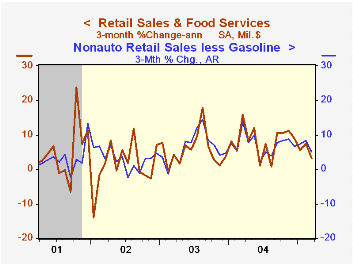 Global| Apr 13 2005
Global| Apr 13 2005U.S. Retail Sales' Gain Light
by:Tom Moeller
|in:Economy in Brief
Summary
US retail sales rose 0.3% in March but the gain fell quite short of Consensus expectations for a 0.8% rise. The 0.5% increase in February was unrevised though figures back to 2003 were revised slightly lower. March sales excluding [...]

US retail sales rose 0.3% in March but the gain fell quite short of Consensus expectations for a 0.8% rise. The 0.5% increase in February was unrevised though figures back to 2003 were revised slightly lower.
March sales excluding motor vehicles also disappointed Consensus expectations for a 0.6% rise.The 0.1% up tick followed a downwardly revised 0.6% increase in February.
Spending on discretionary items eased after increasing strongly through February. Sales at furniture & home furnishings stores slipped 0.5% (+4.1% y/y) after a 1.5% February jump. General merchandise stores reversed an unrevised 0.7% (+4.4% y/y) gain in February and apparel store sales dropped 1.9% (+1.6% y/y) after unrevised gains of 1.1% and 1.9% during the prior two months.
March nonauto retail sales less gasoline fell 0.1% (+5.4% y/y) following a 0.5% February increase. Gasoline service station sales jumped 2.1% (17.8% y/y) as gasoline prices rose 8.9% to an average $2.08 per gallon. In the second week of April gasoline prices rose further to an average $2.28.
Sales of nonstore retailers (internet and catalogue) jumped 1.2% m/m (+13.4% y/y).
Building material store sales surged 1.5% (+5.5% y/y) but the y/y gain eased considerably from the earlier pace. The comparison was tough given the 9.7% m/m spike in March 2004.
Economic Policy and the Sustainability of U.S. Productivity Growth from New York Federal Reserve Bank President Timothy F. Geithner are available here.
The minutes to the latest meeting of the Federal Open Market Committee can be found here.
| Mar | Feb | Y/Y | 2004 | 2003 | 2002 | |
|---|---|---|---|---|---|---|
| Retail Sales & Food Services | 0.3% | 0.5% | 5.8% | 7.3% | 4.3% | 2.5% |
| Excluding Autos | 0.1% | 0.6% | 6.6% | 8.3% | 4.7% | 3.3% |
Tom Moeller
AuthorMore in Author Profile »Prior to joining Haver Analytics in 2000, Mr. Moeller worked as the Economist at Chancellor Capital Management from 1985 to 1999. There, he developed comprehensive economic forecasts and interpreted economic data for equity and fixed income portfolio managers. Also at Chancellor, Mr. Moeller worked as an equity analyst and was responsible for researching and rating companies in the economically sensitive automobile and housing industries for investment in Chancellor’s equity portfolio. Prior to joining Chancellor, Mr. Moeller was an Economist at Citibank from 1979 to 1984. He also analyzed pricing behavior in the metals industry for the Council on Wage and Price Stability in Washington, D.C. In 1999, Mr. Moeller received the award for most accurate forecast from the Forecasters' Club of New York. From 1990 to 1992 he was President of the New York Association for Business Economists. Mr. Moeller earned an M.B.A. in Finance from Fordham University, where he graduated in 1987. He holds a Bachelor of Arts in Economics from George Washington University.






